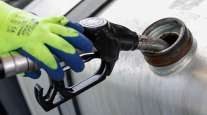Haslam Says Pilot Finds Few New Problems During Audit of Diesel Fuel Rebate Program
This story appears in the Oct. 7 print edition of Transport Topics.
Pilot Flying J CEO Jimmy Haslam said last week that the truck-stop chain has completed an internal audit of customers to identify any wrongdoing and “make right 100%” of any errors it has found.
“I cannot be specific but can generalize that we are finding discrepancies in a relatively small number of our almost 7,000 diesel fuel sales customer accounts audited and that the amount we’ve paid to correct those discrepancies represents a very small percentage of our overall diesel fuel sales,” Haslam said during a brief Sept. 30 news conference at the company’s headquarters in Knoxville, Tenn.
Haslam also said Pilot has switched all manual customer rebate accounts to electronic, placed an undisclosed number of its sales staff on administrative leave and created a “compliance advisory committee” of outside experts.
“We are taking this negative and turning it into a strength that will stand us in good stead for years to come,” he said. “We are committed to ensuring this does not ever happen again.”
Haslam said he could not answer questions from reporters because of the ongoing federal investigation.
“I think this goes without saying: This has been a very humbling, very embarrassing time for myself, our family and Pilot Flying J. There’s no other way to say it,” he said.
The audit and other actions were taken in response to issues first disclosed in an FBI affidavit after federal investigators descended on the company’s headquarters in April. The affidavit and subsequent plea agreements filed by seven of the company’s sales executives detailed a fraudulent scheme to shortchange Pilot’s motor carrier customers of diesel fuel rebates.
“I think everybody is aware that seven members of that sales team have since pleaded guilty, we have put several other members of that administrative team on leave and have now begun rebuilding our sales team,” Haslam said.
Haslam has denied he had personal knowledge of the rebate fraud scheme.
Since the FBI raid, more than two dozen truckers have filed lawsuits in state and federal courts seeking damages. In July, Pilot agreed to an out-of-court settlement with eight plaintiffs for a sum that could cost the company at least $26 million.
Pilot, the nation’s biggest truck-stop chain, is currently finalizing its audit of all of its other diesel fuel accounts with any type of direct discount agreement from 2005 to date and expects to complete the process by the end of the year, Haslam said.
“We will not be satisfied until we have identified every single discrepancy, made every affected customer whole and regain the confidence of all our customers,” he said. “Since April 15, we have done our best to investigate the allegations made against some members of our diesel fuel sales team, to identify any wrongdoing, and to assure our customers that we will not tolerate that kind of behavior anywhere in our company, and we will make right 100% any errors we discover.”
Haslam said that Pilot also has put almost every customer contract in writing and will continue to do so in the future.
“Our goal is to make certain every customer is intricately involved with what his or her contract says so that parties always know the exact expectation of each contract,” he added.
Haslam reiterated that Pilot earlier this year hired Washington, D.C., criminal defense attorney Reid Weingarten to head an investigation into the fraud allegations and report back directly to the board upon its completion.
“I do not know when Mr. Weingarten and his team will complete their work or if the board will choose to make it public,” Haslam said.
Pilot’s attorney, Aubrey Harwell Jr. of Nashville, Tenn., called Haslam’s statement “right on.”
“I don’t know of any company that reacted as positively and constructively as Pilot has,” Harwell told Transport Topics.




